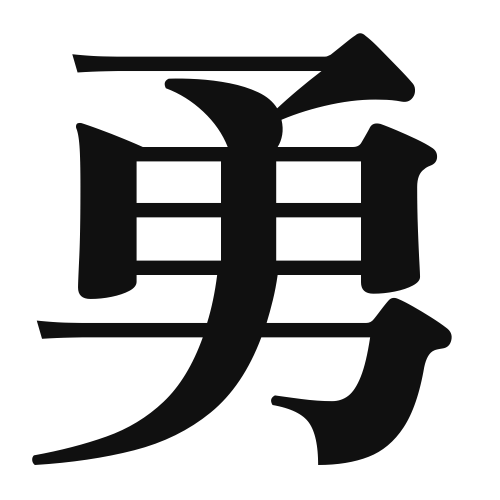1. Overview of Meaning
The kanji “勇” (yū) means “courage” or “bravery.” It represents the quality of being willing to face danger or challenges with a strong heart.
2. Formation and Radical
Formation of the Kanji: The kanji “勇” is a phonetic-ideographic character (形声文字). It combines the radical for “strength” (力) with a phonetic component that suggests its pronunciation.
Radical: The radical of “勇” is 力 (chikara), which means “power” or “strength.” This radical emphasizes the idea of strength associated with courage.
3. Examples of Usage
Common Words and Phrases:
- 勇気 (yūki) – courage
- 勇敢 (yūkan) – brave
Example Sentences in Daily Conversation:
- 彼は勇気を持って挑戦しました。 (Kare wa yūki o motte chōsen shimashita.) – He faced the challenge with courage.
- 勇敢な行動が必要です。 (Yūkan na kōdō ga hitsuyō desu.) – Brave actions are necessary.
4. Synonyms and Antonyms
Similar Kanji:
- 胆 (tan) – This kanji also relates to courage but emphasizes boldness and audacity.
- 気 (ki) – This kanji means “spirit” or “energy,” and while it relates to courage, it has a broader meaning.
Antonyms:
- 怯え (obieru) – This means “to be afraid” or “to be timid,” representing the opposite of courage.
- 無気力 (mukiryoku) – This means “lack of energy” or “apathy,” which contrasts with the active quality of courage.
5. Cultural and Historical Background
Relation to Japanese Culture: In Japanese culture, courage is highly valued, often associated with samurai and their code of honor. The concept of “勇” is deeply embedded in various aspects of life, including literature and art.
Proverbs and Idioms:
- 勇気を出す (yūki o dasu) – “to muster up courage,” often used when encouraging someone to take action.
- 勇者 (yūsha) – “hero,” a term used to describe someone who displays great courage in difficult situations.
